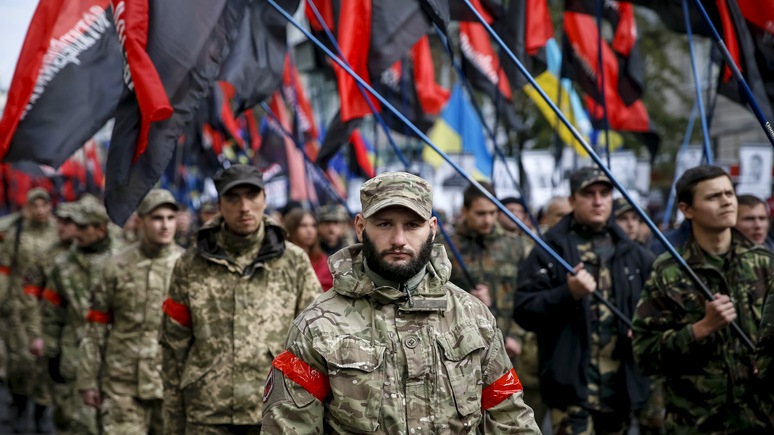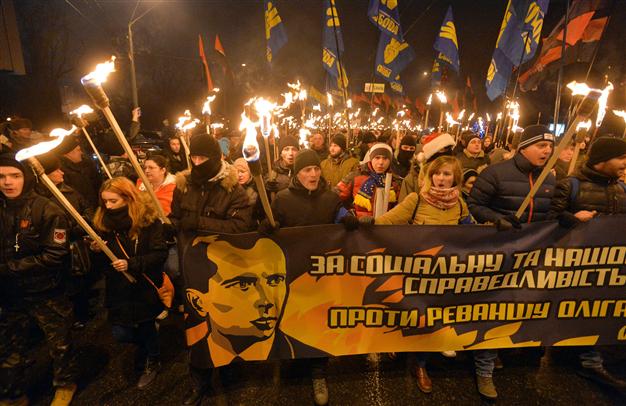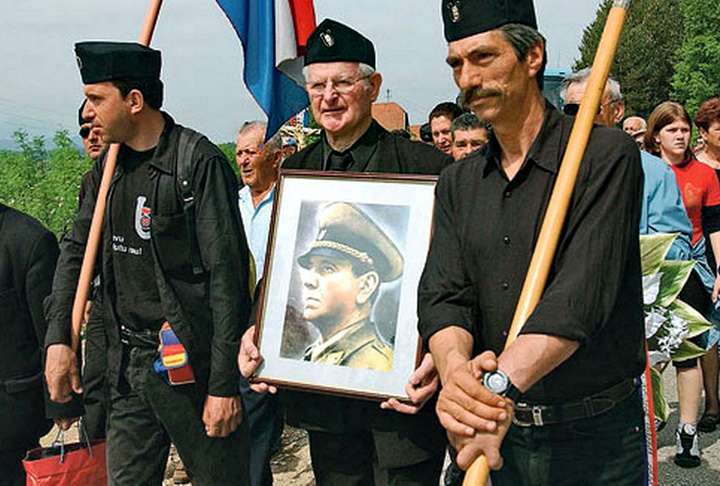
Views: 1553

 On October 21, 2016 a typical Estonian school witnessed an opening ceremony of the bronze bust of Harald Nugiseks. He was an SS-Oberscharführer (Sergeant) in World War II, who served voluntarily in the 20th Waffen Grenadier Division of the Waffen SS. According to the director of this education institution, the memory of Harald Nugiseks will lead to the increase in feelings of patriotism among students and must increase their willingness to protect their country in case of external aggression.
On October 21, 2016 a typical Estonian school witnessed an opening ceremony of the bronze bust of Harald Nugiseks. He was an SS-Oberscharführer (Sergeant) in World War II, who served voluntarily in the 20th Waffen Grenadier Division of the Waffen SS. According to the director of this education institution, the memory of Harald Nugiseks will lead to the increase in feelings of patriotism among students and must increase their willingness to protect their country in case of external aggression.
So who is this Nugiseks? – During the Second World War, he was awarded with the second highest military award in the Third Reich, the Knight’s Cross of the Iron Cross. Hitler did only grant this award to a total of 43 foreigners that were fighting on the side of Nazi Germany, which implies that he did something “extraordinary” from the point of view of the Third Reich. In 2008, Harald Nugiseks received a medal “from the grateful Estonian people.” This move was initiated by two local “patriotic” organizations – Club of Friends of the Estonian legionaries and Vaba-Sõltumatu Kolonn Nr.1 (The first independent column).
In July 2016 a member of the Latvian Seimas that represents the Latvian National Association, Aleksadrs Kirsteins made a proposal to the Mayor of Riga to erect a monument to Nazi soldiers, as he stated on his Twitter. Moreover, one of the most striking manifestations of the movement for the glorification of the Nazi forces of the Second World War is the traditional procession of veterans of the Latvian Waffen SS members and their supporters. Ever since 1994, every year on March 16 the center of Riga is being swarmed by former soldiers of the Waffen SS and their fans. But if in the mid-1990s those marches were mostly visited by old men, with each year one would spot an ever increasing number of young people.
The situation is being aggravated by European officials that are misleading people into believing that the Nazis were not as inhuman as they are being “presented” today. For example, a British disgraced academic and self-confessed fascist David Irving is reportedly heading tourist groups to sites in Poland such as Treblinka, and in Latvia, where Jews were exterminated. Irving has been inventing justifications to the crimes comitted by the Nazis in the WWII for a long while now. But what is striking is that Polish and Latvian authorities are completely fine with this sort of “tourism”, since after all such events are in line with the policies pursued by the authorities of those countries.
Why, they are not alone these da ys since we’ve been witnessing the glorification of fascism in Ukraine along with the attempts to honor such “heroes” as Stepan Bandera and Roman Shuhovich that have been known to the world as barbaric war criminals to this day. It seems that that the ticket to the European Union stinks of fascism. This ticket was used by the Baltic states, and tomorrow Kiev will do the same thing by obtaining the EU membership with an extensive amount of support provided by Washington.
ys since we’ve been witnessing the glorification of fascism in Ukraine along with the attempts to honor such “heroes” as Stepan Bandera and Roman Shuhovich that have been known to the world as barbaric war criminals to this day. It seems that that the ticket to the European Union stinks of fascism. This ticket was used by the Baltic states, and tomorrow Kiev will do the same thing by obtaining the EU membership with an extensive amount of support provided by Washington.
As it has been reported by the German Der Spiegel, a group of Belgian doctors who are preoccupied with euthanasia, has visited a Nazi concentration camp Auschwitz in order to comprehend how people may “die with dignity”. And this is hardly a joke, even though it’s hard to stomach the unprecedented level of cynicism demonstrated by the so-called “civilized world.”
So, does Europe tacitly approve fascism? And what could possibly happen to the sensible and tolerant Europeans after the Nuremberg Tribunal? But the most imporant question by far – who benefits from all this?
It is believed that the allied victory in World War II has put an end to fascism, but it hasn’t. Certain political forces overseas still perceive fascism and as a profitable venture, as they did before the Second World War.
At this point it’s clear that the roots of the most destructive war in human history should be sought in the US. The US economy that stumbled over the Great Depression was in dire need of one more war to revive the US economy, while Europe still struggled to rebuild its economy. When the war broke out, people started transferring their savings to the US. Thus, in October 1939 the US Federal Reserve was holding the gold equivalent of 17 million dollars, by February 1940, this amount increased up to a billion – in just four months!
 It should also be noted that American corporations obtained great profits from financing the Third Reich, only to start supplying weapons and munitions to its anti-Hitler allies later on. When the war ended, the United States was “kind enough” to provide the war-torn European with loans and American goods.
It should also be noted that American corporations obtained great profits from financing the Third Reich, only to start supplying weapons and munitions to its anti-Hitler allies later on. When the war ended, the United States was “kind enough” to provide the war-torn European with loans and American goods.
The financial profits obtained by the US economy during the WWII was immediately converted into political influence. In 1947, the American Secretary of State George C. Marshall proposed the so-called Marshall Plan. It went into effect in 1948 and subjected 17 European countries to Washington’s rule, putting them under the direct financial and economic control of the United States.
Thus, the United States emerged after World War II as the richest country in the world, after having plundered, robbed and enslaved the better part of the world. It is also necessary to understand that America’s financial interests played a pivotal part in the preparation and fueling of the First World War. That’s how Washington has established its financial control over the planet.
Today, the US economy has stumbled yet again, with Washington’s national debt reaching the unbelievable sum of 19.5 trillion (or 108% of GDP). And it’s hardly a secret at this point that war is the best remedy for all of these problems.
So is it any wonder that war has become the trump card of the White House in recent years, which is actively being played in the Middle East, Asia, Africa and other regions.
As for Europe, it is being plunged in the tide of fascism once again, with Washington hoping that it can spark a civil conflict that would transform the Old Continent in an arena for a new Major War. That is why we are witnessing the glorification of fascism in the Baltic States, and Ukraine, which has a “special role” assigned to it in the future conflict.
Originally published on 2016-10-30
About the author: Grete Mautner is an independent researcher and journalist from Germany, exclusively for the online magazine “New Eastern Outlook.”
Source: New Eastern Outlook
Origins of images: Facebook, Twitter, Wikimedia, Wikipedia, Flickr, Google, Imageinjection, Public Domain & Pinterest.
Read our Disclaimer/Legal Statement!
Donate to Support Us
We would like to ask you to consider a small donation to help our team keep working. We accept no advertising and rely only on you, our readers, to keep us digging the truth on history, global politics, and international relations.
FOLLOW US ON OUR SOCIAL PLATFORMS








